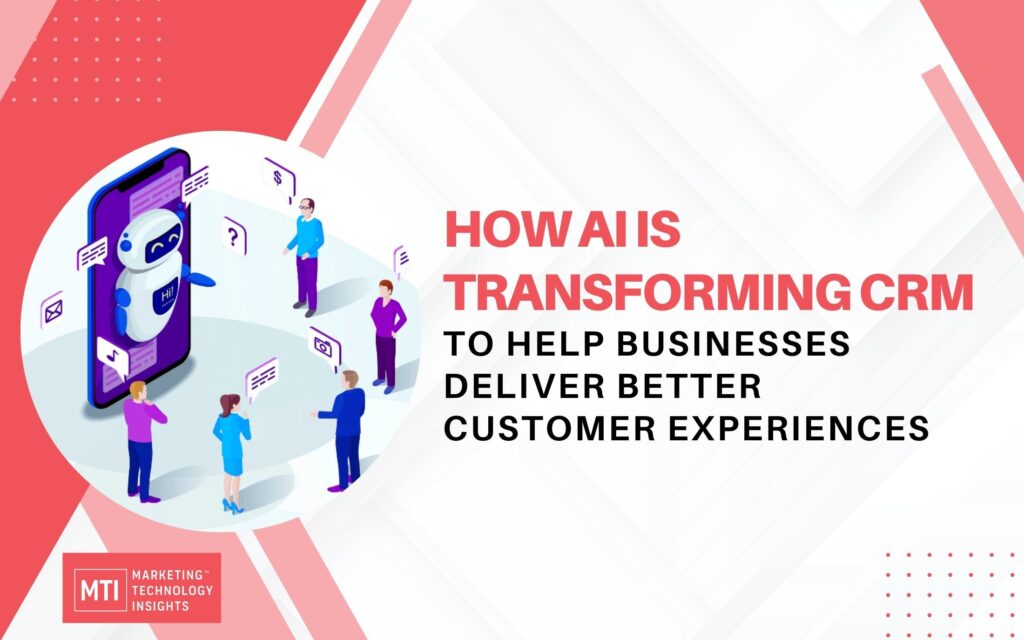Artificial intelligence can help customer relationship management (CRM) softwares automate routine business processes like entering customer data, cleaning redundant information, reducing human errors, and using data analytics and forecasting to improve decision-making.
Customer relationship management (CRM) software has long been a staple for businesses of all sizes. It helps businesses track customer interactions, manage sales pipelines, and provide customer support. But in recent years, AI has begun to transform CRM, making it even more powerful and effective. CRM systems now use AI to automate tasks, personalise customer experiences, and make better decisions.
In today’s digital world, it is essential for businesses to adopt AI capabilities to stay ahead of the curve. AI-based CRM can help businesses to increase efficiency and productivity, improve customer experience and execute well-informed and data-backed decisions.
Although a relatively new concept, the prospect of using AI in a CRM tool is picking up pace as an industry standard. Businesses of all sizes are adopting AI-based CRM softwares in an attempt to notch-up their customer relationships and scale their businesses. Let us understand one by one how AI-based CRM can actually help your business.
What are the current capabilities of AI in CRM?
AI-powered chatbots and virtual assistants
AI-powered chatbots and virtual assistants in CRM software are computer programs that use artificial intelligence (AI) to simulate conversation with humans. They can be used to automate a variety of tasks, including:
- Qualifying leads
- Answering customer questions
- Scheduling appointments
- Providing support
- Collecting feedback
AI-powered chatbots and virtual assistants can be integrated with CRM software to provide a more seamless and personalised customer experience. For example, a chatbot could be used to qualify leads on the company’s website, and then pass those leads to sales representatives for follow-up. Or, a virtual assistant could be used to answer customer questions about their account or products, and then escalate more complex issues to human support agents.
AI-powered chatbots and virtual assistants can provide:
- 24/7 customer support
- Ability to answer customer questions quickly and accurately
- The intelligence to qualify leads and schedule appointments, which can free up sales representatives to focus on closing deals
- Automation of tasks that would otherwise be performed by human employees
- Enhanced customer experience by remembering customer preferences and providing relevant information
Predictive scoring
One of the strongest features of AI in CRM, predictive scoring uses machine learning algorithms to analyse a wide range of data points, including customer interactions, purchase history, and website behaviour, to determine which leads are most likely to convert into paying customers. It works by assigning a score to each lead based on their behaviour and other relevant data. This score can then be used to prioritise leads and focus sales efforts on those that are most likely to result in a sale.
Sentiment Analysis
Sentiment analysis is the process of analysing digital text to determine if the emotional tone of the message is positive, negative, or neutral. Today, companies have large volumes of text data like emails, customer support chat transcripts, social media comments, and reviews. For example, a sales team can use AI to identify leads that are most likely to convert into customers based on their reviews. For example, a lead who is very positive about the company’s products or services is more likely to convert than a lead who is neutral or negative.
Real-time data analysis
AI in CRM can help with real-time data analysis in a number of ways. For example, AI can be used to:
- Identify patterns and trends: AI can analyse large amounts of customer data in real time to identify patterns and trends that would be difficult or impossible for humans to spot on their own. This information can then be used to improve marketing campaigns, customer service, and other business operations.
- Predict customer behaviour: AI can also be used to predict customer behaviour based on their past interactions with the company. This information can then be used to personalise the customer experience and offer more relevant products and services.
- Automate tasks: AI can also be used to automate tasks such as lead scoring, customer segmentation, and customer support. This can free up employees to focus on more strategic tasks.
A use case can be that of a sales team which uses AI to identify leads that are most likely to convert into customers, and then prioritise their outreach efforts accordingly.
In What Ways Can Businesses Benefit From an AI-Based CRM Software?
- Predicting customer needs: AI can analyse customer data to identify patterns and trends that can be used to predict customer needs. This information can then be used to proactively reach out to customers with relevant offers and support.
- Personalising the customer experience: By analysing customer demographics, purchase history, and other data points, AI can personalise customer experience by tailoring interactions and offerings to each individual customer’s needs and preferences.
- Automating tasks: By automating recurring yet critical tasks that are involved in customer relationship management, such as lead generation, qualification, and nurturing. This frees up customer service representatives to focus on more complex and strategic tasks.
- Providing insights: AI can provide insights into customer behaviour, preferences, and satisfaction. This information can be used to improve the customer experience, develop new products and services, and make better business decisions.
- Make better decisions: AI can provide businesses with insights into customer behaviour and trends. This information can be used to improve marketing campaigns, product development, and overall business strategy.
Here are a few specific examples of how AI-infused CRM is being used to improve customer experiences:
- A financial services company uses AI to analyse customer data and identify customers who are at risk of churning. The company then proactively reaches out to these customers with offers and support to help them stay with the company.
- An e-commerce company uses AI to personalise the customer experience by recommending products to customers based on their purchase history and browsing behaviour. The company also uses AI to automate tasks such as order processing and customer support.
- A healthcare provider uses AI to analyse patient data and identify patients who are at risk of developing certain diseases. The provider then proactively reaches out to these patients to offer preventive care and support.
Overall, AI-infused CRM is a powerful tool that can help businesses deliver better customer experiences. By automating tasks, predicting customer needs, and personalising the customer experience, AI can help businesses build stronger customer relationships and improve their bottom line.
For marketers, AI-infused CRM can be a game-changer. By using AI to gain insights into customer behaviour and preferences, marketers can create more targeted and effective campaigns. They can also use AI to automate tasks such as lead generation and nurturing, freeing up their time to focus on more strategic initiatives.
If you’re not already using AI-powered CRM, now is the time to start. It’s one of the best investments you can make to improve your customer experience and grow your business.
Tips for getting started with AI-powered CRM
- Identify your needs: What are your top priorities when it comes to customer relationship management? Are you looking to improve customer satisfaction, reduce churn, or increase sales? Once you know your needs, you can start to look for AI-powered CRM solutions that can help you achieve your goals.
- Choose the right solution: There are a number of different AI-powered CRM solutions available on the market. When choosing a solution, it’s important to consider the size of your business, your budget, and your specific needs.
- Implement and integrate: Once you’ve chosen a solution, it’s important to implement it properly and integrate it with your existing systems. This will help you to get the most out of your investment.
- Train your team: Make sure to train your team on how to use the new AI-infused CRM solution. This will help them to get the most out of it and provide the best possible customer experience.
By following these tips, you can start using AI-infused CRM to improve your customer experience and grow your business.



